12 Dec2019
New Education Doctorate Focused on Social-Emotional Learning Is One of the First of Its Kind
By Kate Stringer

Kindergarten teacher and doctoral student Kimberly Atkinson directs her students in a stretching exercise with belly breathing to help them reset their bodies and minds for learning.
Ed Prep Matters features the “Revolutionizing Education” column to spotlight the many ways AACTE, member institutions, and partners are pioneering leading-edge research, models, strategies and programs that focus on the three core values outlined in the current AACTE strategic plan: Diversity, Equity, and Inclusion; Quality and Impact; and Inquiry and Innovation.
This article originally appeared in The 74 and is reprinted with permission.
Seven years ago, Michael P. Alfano was sitting in his office at Southern Connecticut State University when a faculty member ran into the room in tears. That was how he first learned about the deadly school shooting 20 miles away at Sandy Hook Elementary School, where 26 people—including a student in his graduate education program, first-grade teacher Victoria Soto—were killed.
The tragedy sparked a reckoning in Alfano—and educators across the country—who questioned whether school systems had failed to support individuals who acted out so violently. For Alfano, part of preventing a shooting, bullying, or any other form of violence in schools meant addressing childhood trauma, helping students understand and manage emotions, and training educators in this work.
10 Dec2019
By Jacqueline E. King, Ph.D.
Congratulations to the following individuals who will join the AACTE Board of Directors effective March 1, 2020:
 |
Carine Feyten, President, Texas Woman’s University
President/Provost Representative
|
 |
John Henning, Dean, School of Education, Monmouth University
At-large Representative
|
 |
Marvin Lynn, Dean and professor, College of Education, Portland State University
Council of Academic Deans from Research Education Institutions (CADREI) Representative
|
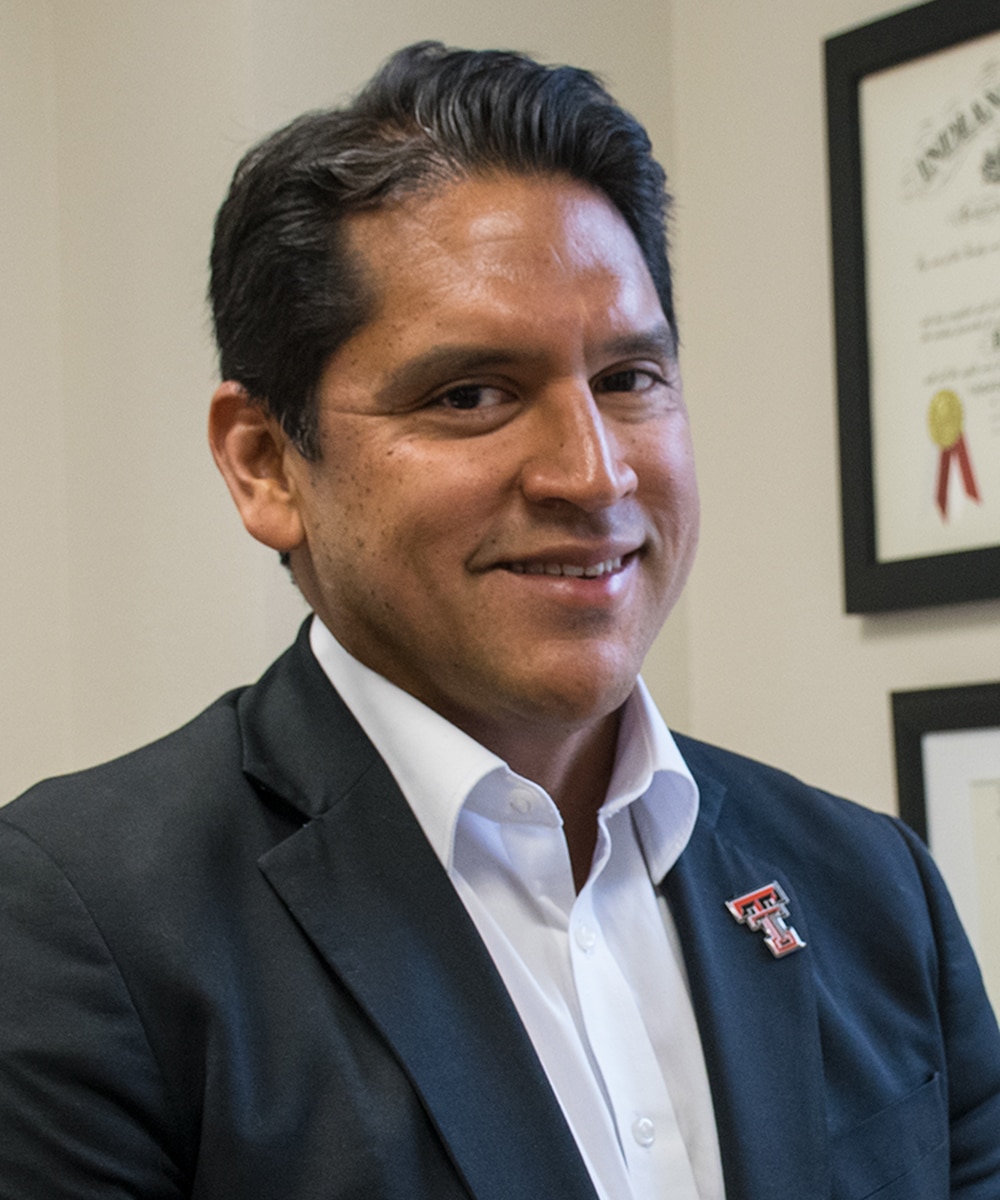 |
Jesse Mendez, Dean and professor, College of Education, Texas Tech University
At-large Representative
|
 |
Kimberly White-Smith, Dean, LaFetra College of Education, University of La Verne
Association of Independent Liberal Arts Colleges for Teacher Education (AILACTE) Representative
|
10 Dec2019
By Jacqueline Rodriguez
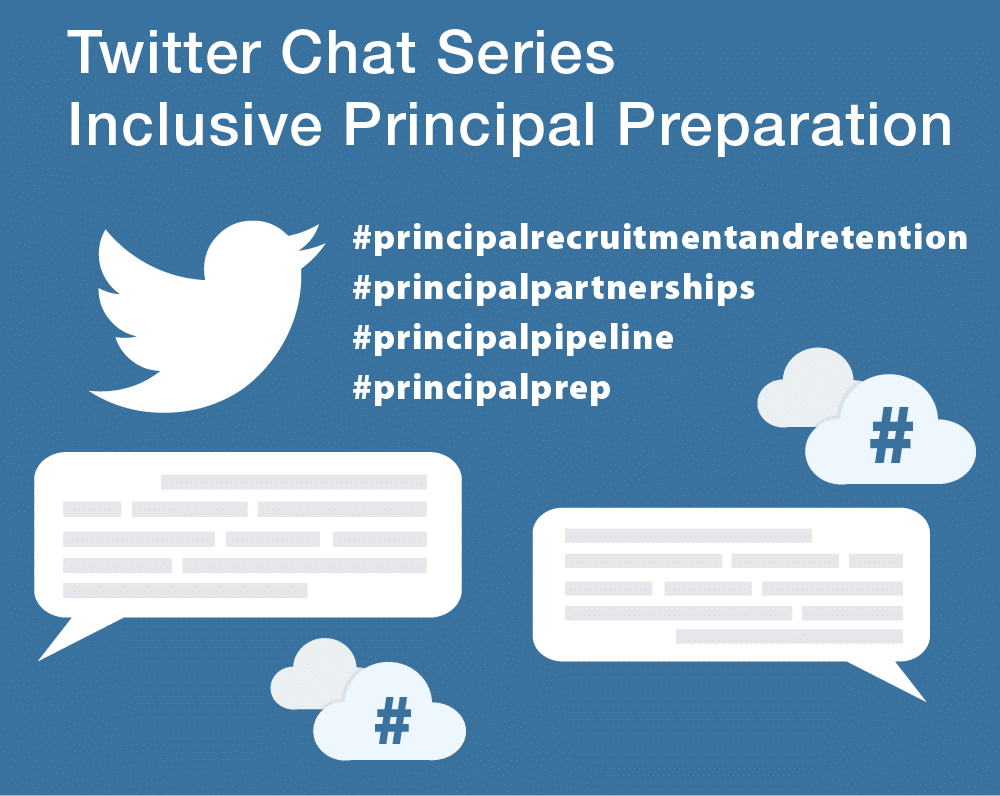 “Clinical learning experiences for candidates must include real-time work with real data and in real settings,” said Janis Carthon, an associate professor at Albany State University in response to AACTE’s Twitter chat question focused on the use of data to support principal preparation for 21st century learning. Carthon joined other experts in the area of principal and leader preparation during AACTE’s second Twitter Town Hall on December 5.
“Clinical learning experiences for candidates must include real-time work with real data and in real settings,” said Janis Carthon, an associate professor at Albany State University in response to AACTE’s Twitter chat question focused on the use of data to support principal preparation for 21st century learning. Carthon joined other experts in the area of principal and leader preparation during AACTE’s second Twitter Town Hall on December 5.
AACTE is hosting four Twitter Chat Town Halls in 2019 aligned with its Wallace Foundation Webinar Series. All AACTE members and education stakeholders are encouraged to follow the Twitter hashtags noted below to participate in the Twitter chats, where experts join the public in dialoguing about principal and leader recruitment, retention, support, and successful clinical experiences.
The next Twitter Chat Town Hall will take place December 10, and will addresses the From Teacher to Principal: Educational Leadership Tracking Systems that AACTE partner the Wallace Foundation developed in collaboration with their University Principal Pipeline Initiative. Follow @AACTE and use #principalpipeline to join the conversation from 5:00 – 6 p.m.
09 Dec2019
By Patricia Alvarez McHatton
Racist Curricula in the 21st Century Do Exist
Any curriculum, even the most enlightened, has traces of racism. This is simply because we all have biases that come through in multiple ways. Our responsibility as educators is to be critically self-reflective and continuously monitor ourselves, our work, and our interactions with both the students we teach and those around us.
Invariably, believing we are culturally and linguistically responsive and sustaining is an indication that we still have work to do. This is because we are always in a state of becoming. New experiences and knowledge expand our ways of thinking and intersect with our lived experiences making the familiar strange. This is true for individuals and curriculum. That is why continuous critical self-reflection is essential as it affords us the opportunity to negotiate uncomfortable and challenging spaces, experiences, and interactions. It is through this disruption that we learn.
06 Dec2019
Augusta University on a Mission to Recruit More African American Male Teachers
By Stacey Eidson
Ed Prep Matters features the “Revolutionizing Education” column to spotlight the many ways AACTE, member institutions, and partners are pioneering leading-edge research, models, strategies and programs that focus on the three core values outlined in the current AACTE strategic plan: Diversity, Equity, and Inclusion; Quality and Impact; and Inquiry and Innovation.
This article originally appeared in JagWire and is reprinted with permission.

Growing up in Elberton, Georgia, Marcus Allen had a lot of incredible teachers who inspired him to be the man he is today.
They were thoughtful, patient and caring, but Allen, who is now the principal of Grovetown Middle School in Columbia County, admits there was one major component missing throughout his childhood education.
“Back then, I didn’t see people who looked like me teaching,” Allen said. “I didn’t have any African American male teachers at my school. And I think it’s important for students to be able to see someone who they can relate to in the classroom. Somebody who they can say, ‘He really might be able to advocate for me.’”
06 Dec2019
By Deborah Koolbeck
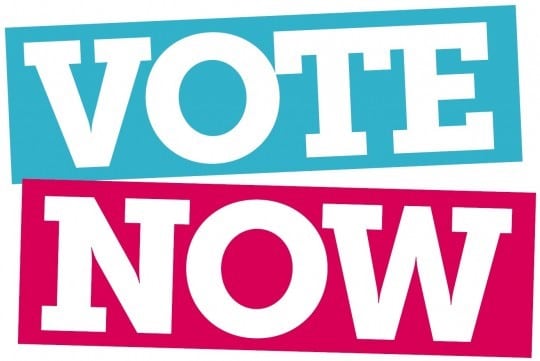
As the year comes to a close, it is time for AACTE State Chapter presidents and ACSR Liaisons to cast their ballots in the 2019 election for the ACSR Executive Committee. As a reminder, the state chapters are divided into four regions: West, Midwest, South and Northeast. Annually, the ACSR voting members elect the ACSR Executive Committee Chair-Elect, and two regions elect their Region Representative to serve on the ACSR Executive Committee. This year the South and the Midwest regions are electing new Region Representatives.
06 Dec2019
By Katrina Norfleet
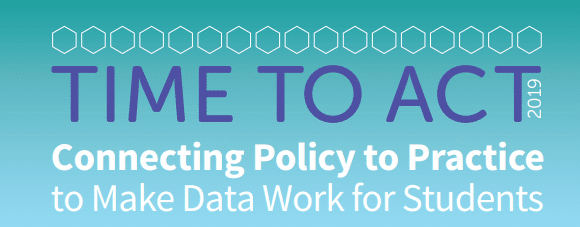
The new Data Quality Campaign (DQC) annual report, Time to Act 2019, underscores that the most effective state efforts to improve student outcomes don’t exist in a silo; they cut across multiple policy priorities to make data work for students. The report, released this week, highlights that state policymakers—state education agency leaders, state boards, legislators, and executive leadership—must prioritize investments in data access and use.
DQC’s policy priorities provide a framework to organize action that supports K-12 student achievement and emphasize that people must have the data they need to answer questions and take action. DQC outlines the following four priorities for states:
- Measure What Matters. Be clear about what students must achieve and have the data to ensure that all students are on track to succeed.
- Make Data Use Possible. Provide teachers and leaders the flexibility, training, and support they need to answer their questions and take action.
- Be Transparent and Earn Trust. Ensure that every community understands how its schools and students are doing, why data is valuable, and how it is protected and used.
- Guarantee Access and Protect Privacy. Provide teachers and parents timely information on their students and make sure it is kept safe.
06 Dec2019
By Caitlin Wilson

Faculty from 10 of AACTE’s member institutions convened in Washington, DC on November 22-23 for the first in-person meeting of the Networked Improvement Community (NIC) focused on reducing the shortage of the special education teachers. During the 2-day convening, nearly 40 NIC members came together to share and discuss the work happening at their institutions and their goals for recruiting more teacher candidates into their special education programs in the next 6 months.
Following the NIC model of the Carnegie Foundation’s for Foundation for the Advancement of Teaching, the institutions set individual targets connected to the network’s collective aim statement and driver diagram, which serves as the NIC’s working theory of action. Over the summer, faculty from each institution were invited to participate in a book club lead by AACTE staff: Learning to Improve: How America’s Schools Can Get Better at Getting Better. This book serves as a foundational text for the NIC members in understanding improvement science and how to apply it to their work at their institutions.
05 Dec2019
By Jerrica Thurman
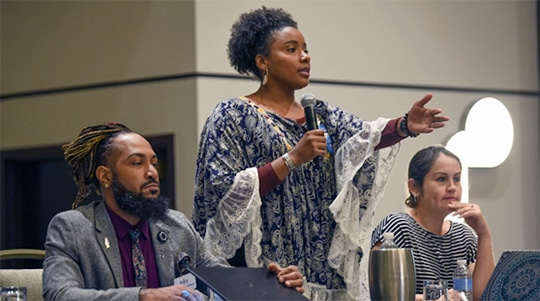
Registration is open for the AACTE 2020 preconference workshops taking place February 27 in Atlanta. AACTE offers five workshops plus the Holmes preconference prior to the start of its 2020 Annual Meeting, providing a deeper dive into complex education issues and equipping attendees with practical skills for advancing programs and institutions.
Get an early start on planning your learning experience at this year’s conference. Preconference workshops are interactive, and allow ample time to share ideas and engage with peers. Secure your spot today for one of these preconference workshops:
05 Dec2019
By Caitlin Wilson
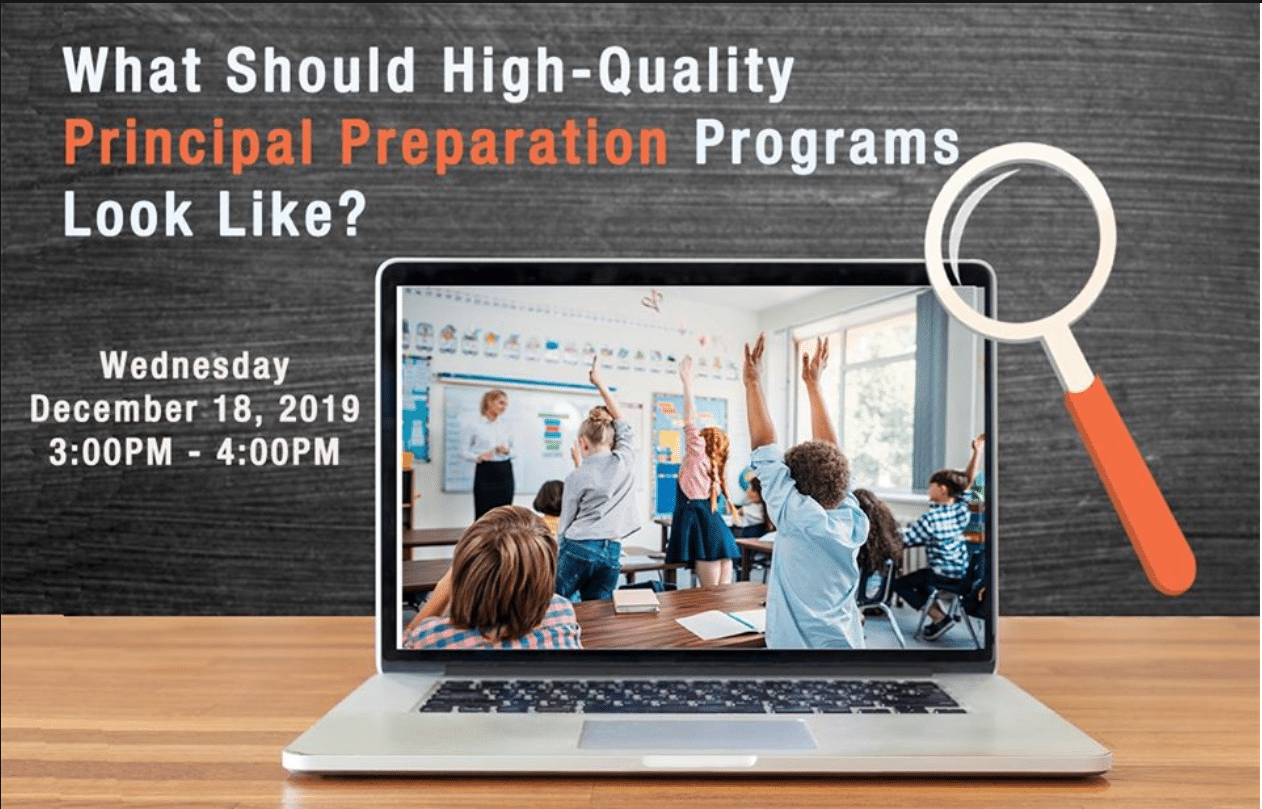 The role of today’s principal is changing. Now, more than ever, school leaders need to be prepared from day one to succeed in a complex and ever-evolving school context. But what does quality principal preparation look like? How can principal preparation programs ensure that school leaders are ready to meet the demands of the job? Join us for our final webinar in the four-part series on principal preparation, a collaboration with the Wallace Foundation, to hear a panel of researchers and practitioners dig into the answers to both of these questions.
The role of today’s principal is changing. Now, more than ever, school leaders need to be prepared from day one to succeed in a complex and ever-evolving school context. But what does quality principal preparation look like? How can principal preparation programs ensure that school leaders are ready to meet the demands of the job? Join us for our final webinar in the four-part series on principal preparation, a collaboration with the Wallace Foundation, to hear a panel of researchers and practitioners dig into the answers to both of these questions.
05 Dec2019
By Katrina Norfleet
 To show support and help advocate for public schools in the United States, AACTE is inviting members to add your voice to the thousands of others vowing to stand up for students and schools. The Learning First Alliance (LFA) has launched the Pledge for Public Schools in preparation for Public Schools Week 2020, a national celebration for educators and parents to spotlight the successes of their students and local schools in communities across the nation, and to bring attention to the critical issues facing schools, students, and educators.
To show support and help advocate for public schools in the United States, AACTE is inviting members to add your voice to the thousands of others vowing to stand up for students and schools. The Learning First Alliance (LFA) has launched the Pledge for Public Schools in preparation for Public Schools Week 2020, a national celebration for educators and parents to spotlight the successes of their students and local schools in communities across the nation, and to bring attention to the critical issues facing schools, students, and educators.
LFA reports that U.S. public schools educate 50.8 million students (nine of 10), regardless of ability, race, wealth, language, religion or country of origin. During Public Schools Week 2020, to be held February 24-28, 2020, advocates will take the thousands of pledges to Capitol Hill and state capitals across the country to illustrate to lawmakers how many people are supporting America’s public schools.
Once you take the pledge, LFA asks that you share on social media using the hashtag #PublicSchoolProud. More updates and events leading up to Public Schools Week will be announced at learningfirst.org/publicschoolsweek.
To learn more about LFA, visit learningfirst.org.
03 Dec2019
AACTE’s DEI Video Highlights Promising Practices to Recruit and Retain Teachers of Color
By Jerrica Thurman
Ed Prep Matters features the “Revolutionizing Education” column to spotlight the many ways AACTE, member institutions, and partners are pioneering leading-edge research, models, strategies and programs that focus on the three core values outlined in the current AACTE strategic plan: Diversity, Equity, and Inclusion; Quality and impact; and Inquiry and Innovation.
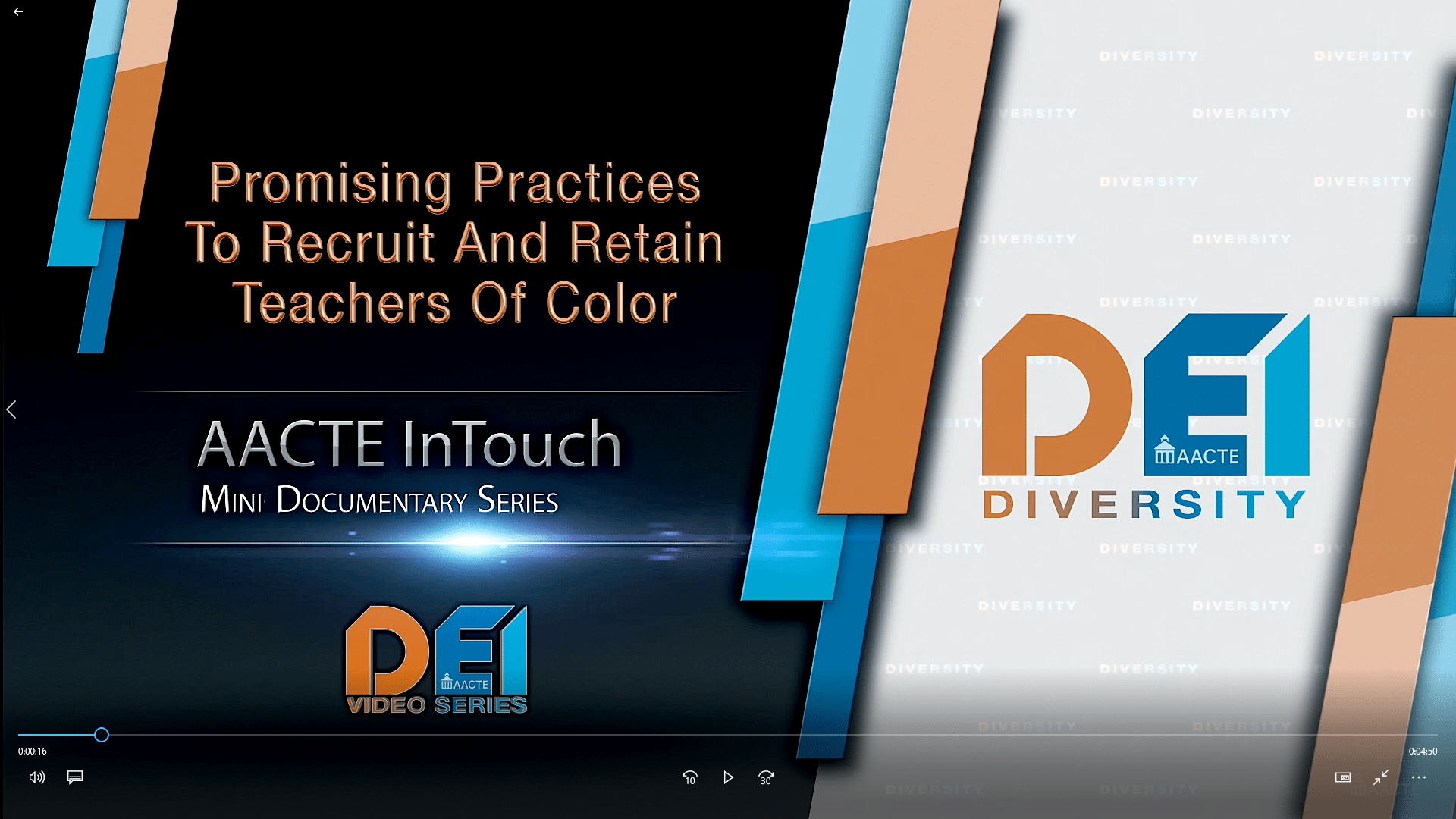
AACTE is focusing on ways that education leaders and colleges of education can employ to address the national shortage of educators of color more effectively. “AACTE’s new mission is to revolutionize education for all learners,” said AACTE Board Chair Kim Metcalf, dean of the college of education at the University of Nevada Las Vegas. “We are shifting our efforts to provide members support and encouragement to be innovative in ways that address not just today’s needs in their local communities, but the needs that those communities will have in years to come.”
03 Dec2019
By Lynn M. Gangone

On November 21, the U.S. Department of Education announced that new data on federal student loan debt and earnings of recent graduates by institution, degree program, and field of study had been added to the College Scorecard consumer website. In addition, the Department of Education made these data available to the public at collegescorecard.ed.gov/data.
As a service to members, AACTE has excerpted the data on education graduates, along with documentation about the data, and provided instructions on how to search for your institution in this large database. Log in and access these resources.
The Department of Education Data suppressed results for smaller programs to safeguard the privacy of graduates. Our review of the data revealed that privacy suppression affects a considerable portion of the database. At larger institutions, data are only available for sizable programs and at smaller institutions, no information may be available. Despite this considerable limitation, AACTE is sharing these data because it is rare to have access to student loan debt and earnings information for recent graduates by field of study.
To provide members with a much richer understanding of how students in education programs are paying for college—and the potential implications for recruiting students to become teachers—we are also preparing a new data brief that will be available at the upcoming Annual Meeting. This report is one in a series of briefs summarizing important data on our profession that we will be releasing early next year. More to come as the AACTE 2020 Annual Meeting approaches!
If you have questions about the College Scorecard data, please contact Jacqueline King at jking@aacte.org.
03 Dec2019
By Michael Dantley

Why are schools still segregated in 2019? The answer to this question is a complicated one. One with roots deep in the history of our educational system. The surface answer has to do with the fact that racist curricula and prejudice within our society still exist. Where you live determines where you go to school. Many times, the poorer, minority students live in lower income neighborhoods. And as children become racially isolated, it then trickles into our schools, resulting in segregation.
In fact, segregation is even evident in schools that are racially diverse. You’ll notice that most students in advanced placement classes are Caucasian or Asian. Who do we see in remedial classes? We see African American students, particularly African American males. Even with a diverse student population, the evidence of systemic segregation is scarily rampant. The deep vestiges of racism and segregation subtly permeate through our schools and it sets dangerous precedents.
27 Nov2019
By Katrina Norfleet
 In an article that originally appeared in The Chronicle of Higher Education, author Julia Piper explores the experiences of Valarie Kinlock as the first black female dean at the University of Pittsburgh. Kinlock, the dean of the School of Education, didn’t realize she was the first when she was hired. Since her appointment, she has gone from being the only black female dean at the university to being one of two. She emphasizes the need for more conversations about racism as more people of color progress to leadership roles.
In an article that originally appeared in The Chronicle of Higher Education, author Julia Piper explores the experiences of Valarie Kinlock as the first black female dean at the University of Pittsburgh. Kinlock, the dean of the School of Education, didn’t realize she was the first when she was hired. Since her appointment, she has gone from being the only black female dean at the university to being one of two. She emphasizes the need for more conversations about racism as more people of color progress to leadership roles.
The article highlights data on the gender of university deans, including the AACTE report published last year: Colleges of Education: A National Portrait. According to the AACTE research, the “average” dean of a college of education is a white woman.








 “Clinical learning experiences for candidates must include real-time work with real data and in real settings,” said Janis Carthon, an associate professor at Albany State University in response to AACTE’s Twitter chat question focused on the use of data to support principal preparation for 21st century learning. Carthon joined other experts in the area of principal and leader preparation during AACTE’s second Twitter Town Hall on December 5.
“Clinical learning experiences for candidates must include real-time work with real data and in real settings,” said Janis Carthon, an associate professor at Albany State University in response to AACTE’s Twitter chat question focused on the use of data to support principal preparation for 21st century learning. Carthon joined other experts in the area of principal and leader preparation during AACTE’s second Twitter Town Hall on December 5.




 The role of today’s principal is changing. Now, more than ever, school leaders need to be prepared from day one to succeed in a complex and ever-evolving school context. But what does quality principal preparation look like? How can principal preparation programs ensure that school leaders are ready to meet the demands of the job? Join us for our final webinar in the four-part series on principal preparation, a collaboration with the Wallace Foundation, to hear a panel of researchers and practitioners dig into the answers to both of these questions.
The role of today’s principal is changing. Now, more than ever, school leaders need to be prepared from day one to succeed in a complex and ever-evolving school context. But what does quality principal preparation look like? How can principal preparation programs ensure that school leaders are ready to meet the demands of the job? Join us for our final webinar in the four-part series on principal preparation, a collaboration with the Wallace Foundation, to hear a panel of researchers and practitioners dig into the answers to both of these questions. To show support and help advocate for public schools in the United States, AACTE is inviting members to add your voice to the thousands of others vowing to stand up for students and schools. The Learning First Alliance (LFA) has launched the
To show support and help advocate for public schools in the United States, AACTE is inviting members to add your voice to the thousands of others vowing to stand up for students and schools. The Learning First Alliance (LFA) has launched the 


 In an article that originally appeared in The Chronicle of Higher Education, author Julia Piper explores the experiences of Valarie Kinlock as the first black female dean at the University of Pittsburgh. Kinlock, the dean of the School of Education, didn’t realize she was the first when she was hired. Since her appointment, she has gone from being the only black female dean at the university to being one of two. She emphasizes the need for more conversations about racism as more people of color progress to leadership roles.
In an article that originally appeared in The Chronicle of Higher Education, author Julia Piper explores the experiences of Valarie Kinlock as the first black female dean at the University of Pittsburgh. Kinlock, the dean of the School of Education, didn’t realize she was the first when she was hired. Since her appointment, she has gone from being the only black female dean at the university to being one of two. She emphasizes the need for more conversations about racism as more people of color progress to leadership roles.